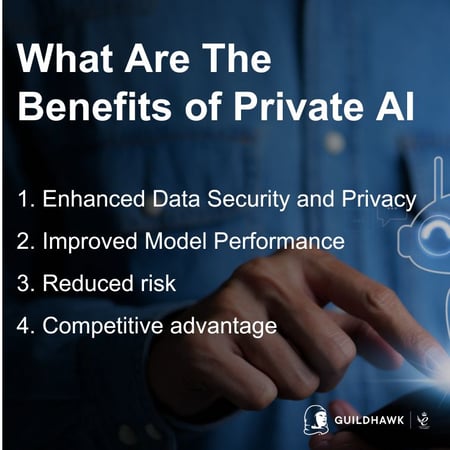
What is Private AI and its Role in Protecting Your Data
Artificial intelligence (AI) is rapidly transforming our world, improving operational efficiency with disruptive solutions like learning new skills from a human avatar that speaks your language to protecting the lives of workers on sites with Apps that automate the translation of safety briefings.
Hard to imagine how anyone could not see such life-saving innovations as anything other than sensational. But there is a little talked about issue that is presenting a big obstacle to introduction of new cutting-edge AI.
It is the growing concerns around data privacy, in particular protection of the intellectual property (IP) contained in the datasets used to train Machine Learning (ML) models. A sort of Catch 22 situation has arisen.
Organisations want the amazing benefits that new technologies like Generative AI and Conversational AI can bring, but they don’t want to disclose their valuable industry datasets to the likes of OpenAI and Google.
There is a flood of bad machine translations that has serious impact on AI training models.
What is Private AI?
Private AI refers to building and deploying AI technologies that respect the privacy and control of users' and organisations' data. It plays a crucial role in safeguarding data privacy and ensuring that sensitive information is not compromised.
Private AI: Overcoming private data privacy concerns
The resistance to surrender company datasets that may contain decades of priceless business intelligence is two-fold.
First, the organisation’s data could harm them if it fell into the hands of a competitor.
Second, savvy business leaders know that Big Tech urgently needs clean high-quality datasets such as these to train their own AI models. Using public AI providers poses potential risks, as they may use customer data for their own purposes, compromising data privacy and control over sensitive data.
This is urgent because dirty data is the poison that can kill AI, and currently the internet is flooded with dubious data. The errors and bias you see generated by AI engines like ChatGPT are the result of using datasets scraped from the web that are not verified – rubbish-in leads to rubbish-out as the old saying goes.
Low-quality datasets are a big challenge with English content (most data available on the internet) and that multiplies when you look at non-English data because much of this content is machine translation that has not been verified.
So, how does an organisation overcome this challenge and introduce transformative AI, without having to give away their precious IP? This is where private AI emerges as a compelling solution, offering a path to leverage the power of AI while fostering trust, protecting data and remaining ethical.
How big is the Private AI market?
The global AI market is projected to reach a staggering $1.811billion by 2030, according to Grand View Research. Despite this growth, a recent survey by PwC revealed that 73% of executives are concerned about the privacy implications of AI for the reasons explained above.
This highlights the need for a responsible approach to AI development and deployment, where data privacy remains a top priority. Building robust AI infrastructure to support private AI is crucial to ensure data privacy, security, and compliance.

What are the benefits of Private AI
The argument for developing Private AI models that protect your data versus and Public AI that does not is compelling. The benefits can be summarised as follows:
- Enhanced Data Security and Privacy: Private AI models are trained on proprietary data, which stays within the organization's control, mitigating risks of unauthorised access or data breaches. This is particularly crucial for industries like AEC, healthcare, finance, media, and legal services, where sensitive or creative data is needed to train machine learning models. Using private AI models built with the company's' own data ensures compliance and practicality.
- Improved Model Performance: Training AI models on domain-specific data often leads to better accuracy and performance compared to generic models trained on diverse datasets. This is because the model becomes tailored to the specific needs, technical language, and cultural nuances of the organisation's operations. Training on your own data further enhances the model's accuracy and productivity.
- Reduced Risk: Private AI trained on domain-specific datasets has the advantage of reducing risk when using corporate Chatbots and Live digital human avatars that use Conversational AI since they help protect against AI generating answers that are wrong. In 2024, a tribunal awarded damages against Air Canada after the airline’s Chatbot gave inaccurate information to a customer, ruling it did not take reasonable care to ensure its Chatbot generated answers that were accurate.
- Competitive Advantage: By leveraging private data, organisations can develop unique AI solutions that address their specific challenges and create a competitive edge in the market. This allows them to innovate, increase profitability and productivity, save money, and differentiate themselves without compromising on quality or data privacy.
The Generative AI conundrum with large language models
Generative AI tools like ChatGPT have inspired organisations to look for new ways to deploy AI for good, but concerns linger about data privacy. Many publicly available services lack transparency regarding data usage, making businesses hesitant to adopt AI solutions that involve sensitive information.
There are concerns over privacy and data security when using public AI models, as they can leave sensitive data vulnerable and lead to regulatory risks.
Even billionaire Elon Musk who has invested heavily into OpenAI has within months started an legal action against OpenAI alleging the company diverged from its original not-for-profit mission. This follows a separate legal action by The New York Times which accused OpenAI of multiple counts of copyright infringements.
Large language models like ChatGPT, which are examples of foundation models, rely on vast sets of data from the internet, posing additional challenges in terms of data security and control.
Private AI: A path forward
Private AI mitigates the risks now being fought over in the courts and boardrooms by offering a solution that allows organisations to:
- Maintain control over their data: Train models on-premises or in the cloud while ensuring data remains private.
- Develop domain-specific models: Improve accuracy and performance by tailoring models to specific needs.
- Increase transparency and trust: Gain greater control over algorithms and foster trust with stakeholders.
What is the future for AI and privacy?
As AI engines become more prevalent, the demand for transparent and trustworthy infrastructure powered by high-quality datasets will grow.
Private AI presents a natural progression, particularly for organisations embracing multi-cloud and hybrid cloud environments. By unifying AI and privacy, organisations can:
- Unlock the full potential of AI: Leverage AI for various applications while safeguarding data privacy. Large language models (LLMs) play a crucial role in this evolving AI landscape, highlighting the importance of responsible AI practices.
- Embrace responsible AI practices: Foster trust, reduce risk, and build a sustainable foundation for AI adoption.
- Navigate the AI future: Confidently approach the evolving landscape of AI with a responsible and ethical mindset.
In conclusion, Private AI is not just about safeguarding data; it is about strategically unifying AI and privacy. This approach empowers businesses to responsibly harness the power of AI, paving the way for a more secure and innovative future.
If you would like to know how Guildhawk can help you develop Private AI solutions powered by clean, high-quality data, please give us a call.
